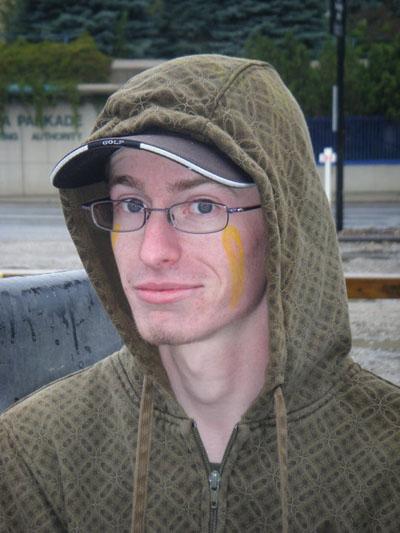When Canadians think of best cities which to come out, Lethbridge probably isn’t the first to come to mind.
But for Tanner Watt, a university student and gay activist in that city, the southern Alberta community was his lifeline: adequately distant from friends and family who knew him as straight, Watt felt safe enough to be himself.
“I was completely in the closet in Calgary,” he explains. Living outside the city, he would drive in to attend gay-positive events as an ally or supporter.
That changed when cousin Kristine Deisman, then the regional coordinator for the queer-positive Student Christian Movement, convinced him to go to Toronto with her for the society’s 2009 conference.
“One of the guys there [friend Tyson Skriver, then president of his university’s gay-straight alliance] was from Lethbridge, and he came about halfway through the conference,” he explains. “We hung out a lot.” A few days after his new friend arrived, Tanner came out to someone for the first time.
Watt found himself unexpectedly supported by Skriver and repeatedly invited into the Lethbridge queer community – so much so that he decided to move. “I made a ton of absolutely amazing friends,” he says. “I was right in the thick of everything.”
Before he knew it, Watt was elected vice-president of the University of Lethbridge Pride Centre. President Emma Ladouceur says Watt has been an instrumental part of Lethbridge’s gay scene.
“If ever somebody needs anything or is in a crisis he’s immediately figuring out what needs to be done or what he can do to make sure it gets done,” she says.
Watt doesn’t give off hardcore activist vibes when you talk to him. He speaks quickly and has a habit of bouncing when he gets excited about something. Ladouceur says the first thing she noticed about the small-framed powerhouse is that “he looked like he needed a sandwich.”
But looks can be deceiving: these kids don’t kid around. The Pride Centre – formerly Gay and Lesbian Integrity Association – is planning its third year of OUTSpoken, an annual queer conference, scheduled for March, that has previously drawn queer celebs like author Ivan Coyote, musician Rae Spoon, Elvira Kurt and John Corvino.
The Centre has also been given its own space on campus, which was furnished and painted in September. “Rainbows everywhere,” Watt jokes. The executive is hoping to have a full roster of volunteers in January, so queer students have a physical space in which to be supported.
For these students, politics is also personal. When Watt and Ladouceur knew a trans student was having trouble at home after coming out to his parents, the two – then roommates – put him up in their house for about two months. Informal counselling for students, many of whom are from communities smaller than Lethbridge, is a major focus for the space. “A lot of people have been dealing with personal family issues,” Ladouceur says. “People feel like ‘everything I’ve ever been told, everything my family’s ever taught me, is completely against the ways that I’m feeling right now.’”
But Ladouceur seems to think the Pride Centre’s brand of hands-on activism is unremarkable. “Everyone has something in their life…that makes life difficult,” she says. “At some point in time, I’m going to need help, but right now I’m going to help you.”
Watt says the best part about working in Lethbridge is that “people really keep surprising me.” He says the opportunity to work directly with people in positions of influence is easy, because the community is small, but the people in it are ready to learn.
“I met with the principal of [Chinook Regional High School]…because we wanted to do an event for OUTspoken,” he remembers. “He knew exactly what was going on with regard to homelessness and suicide rates for queer youth, he had done diversity training with his teachers, he was willing to bend over backwards to let us do an event at this school, which absolutely floored me.”
“I’m constantly having the rednecks of southern Alberta to pop up…but I’m constantly being proven wrong, which is an absolutely wonderful feeling,” he says.
That’s not to say there’s no more work to be done. A University of Lethbridge graduate, Skriver got involved with queer activism after he ended his association with an ex-gay ministry. Mark Spracklin, a student at the university, found his car vandalized last year with homophobic slurs.
Ladouceur sees the challenges as an opportunity – activist work is both pressing and fecund. “Lots still needs to be done…[but] we have lots of people to do what needs doing.”
As much as Watt has loved his experience, he does find himself aching for more space than the small city can offer. “If I wanted to wear my T-shirt around downtown Toronto that says ‘I can’t even think straight,’ it’s no big deal. I wouldn’t feel unsafe,” he says. “In Lethbridge I couldn’t, not alone at least.
“I’ve walked around the shopping mall here holding hands with a guy. It’s not that bad. …But it’s definitely still redneck western Canada,” he says. “That, and just…there’s not many gay guys in Lethbridge.”
Watt says that while he might move into a bigger city after his undergrad, he’s excited to be part of a place that’s changing so quickly. “The amount that Lethbridge has changed and grown in the two years that I’ve been here is immense,” he says. “I feel like I can actually make a change here. That’s a really cool feeling.”


 Why you can trust Xtra
Why you can trust Xtra


